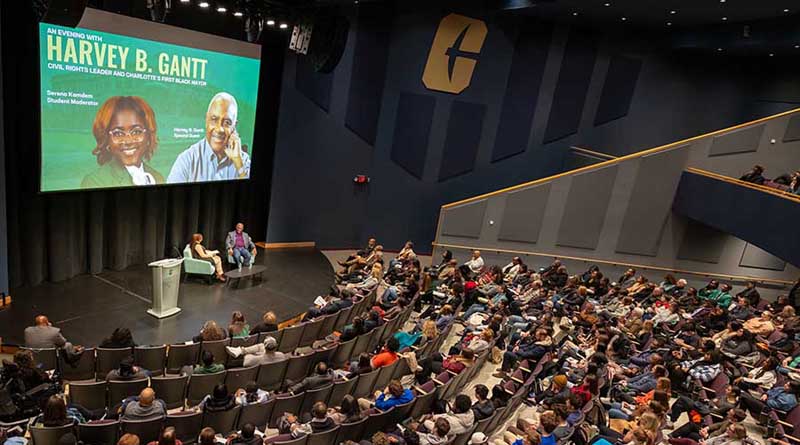Harvey B. Gantt Shares 6 Lessons On Leadership At Charlotte
Headlining UNC Charlotte Niner Nation King Week was distinguished Charlotte architect, civil rights leader and public servant Harvey B. Gantt, Charlotte’s first Black mayor. During a Q&A-style presentation to a standing-room-only McKnight Hall audience, Mayor Gantt shared thoughts and lessons from his remarkable life as well as about leadership and Rev. Dr. Martin Luther King’s legacy. Here are the main takeaways from Mayor Gantt’s campus visit with students, faculty, staff and community members:
Recognize the impact of early influences
“For most of my childhood in Charleston, it was customary for Black people to ‘stay in our place.’ But things started to change. My father firmly believed in the efficacy of civil rights and shared his opinions nightly at our dinner table. He believed that the promise of America was going to be made real for his children. There wasn’t just one moment for me — there were many — that can be considered seminal, and showed me that we all have to do our part to change things. We were not rich financially. But we felt rich in our values, our church and other parts of our experience. And we couldn’t accept that we were less than the majority of society.”
Nurture a spirit to spark change
“I had a spirit that was encouraged by my high school classmates that we could change things. Inspired by the Greensboro Four, 27 of us decided to enact our own sit-in at the S.H. Kress department store lunch counter in Charleston. Our point was for them to serve us a Coke and a hot dog. We wanted to do it in the fashion of Martin Luther King, Jr., nonviolently. We practiced the scene in advance so we could withstand hecklers calling us names, pouring ketchup on our heads, and doing similar things so we would sit resolutely, saying nothing. We were hauled off to the courthouse, fingerprinted and made to stay for seven or eight hours. Then they called our parents.”
Listen and learn
“Outside of my own household, we got to know local civil rights leaders. My dad drove us to NAACP and civil rights meetings; we met icons like Roy Wilkens and James Farmer. He made sure we shook their hands. There also were those from organizations such as the NAACP, Congress for Racial Equality, the Student Nonviolent Coordinating Committee, and, of course, the Southern Christian Leadership Conference led by Rev. Dr. Martin Luther King Jr. I remember how fascinated we were with this 26-year-old preacher. Rosa Parks was certainly a brave soul. But it was MLK we were listening to. He was talking about love; he wasn’t telling us how to fight back. He was saying how love and nonviolence can overcome all of that.”
Never give up
“I found out from my high school guidance counselor that I wasn’t accepted to Clemson. She wanted me to get an education in the institutions that were training architects in this country, which were predominantly white. At the time, less than 1% of architects in the U.S. were African American. So I went to Iowa State. One snowy day, I decided I didn’t like cold weather. I could hear our dinner table conversations where my parents said, ‘If you don’t like this, why are you accepting it?’ Others across the country were trying to integrate their institutions. I told the guys I played cards with, ‘I’m going to apply to Clemson.’ It took five tries. After the fifth one, I filed a lawsuit with the district court in South Carolina; after that we went to the appeals court. They said yes, and the U.S. Supreme Court upheld it. In January 1963, I went to Clemson as its first African American student.
Be willing to veer from the path
“Politics was never a goal. I had started an architectural firm with Jeff Huber, whom I’d met in the ’60s, when the possibility of a white and a Black business owner was still distant. We remained friends and finally started the business we’d dreamed of for years. I was following a path – but sometimes the path veers. Things were happening politically, and I joined the city council, finishing the term of a member who decided to run for the state senate. I loved working in a design office to design buildings and then talking about how to design the city; of course, both of these aligned with my degree in architecture and master’s in city planning. A few years later, I ran for mayor. The city was on the precipice of fantastic growth. I wasn’t thinking about being Charlotte’s first Black mayor; I was thinking I could serve the city. The proudest day of my political career was when I got votes from communities all across Charlotte — white, Black, rich, poor. The citizens invested in me, and I said ‘I’m going to do my best to be the best mayor I can be for them.’”
Share your wisdom
“What would I tell young leaders today? First, learn to listen. As clearly and as focused as possible. Also, do your research to fully understand the issues — and figure out mechanisms that can reverse or support needs you really care about. A leader’s job is to blend together everything you hear across the board. Finally, vote. Voting citizens change outcomes. Take advantage of early voting and encourage others to do the same.”

